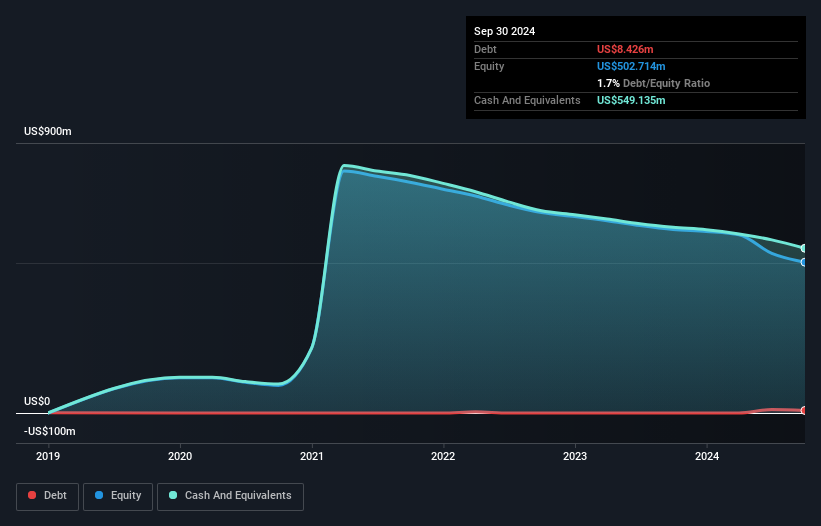Warren Buffett famously said, 'Volatility is far from synonymous with risk.' So it seems the smart money knows that debt - which is usually involved in bankruptcies - is a very important factor, when you assess how risky a company is. We can see that Nuvation Bio Inc. (NYSE:NUVB) does use debt in its business. But the real question is whether this debt is making the company risky.
When Is Debt A Problem?
Generally speaking, debt only becomes a real problem when a company can't easily pay it off, either by raising capital or with its own cash flow. If things get really bad, the lenders can take control of the business. However, a more usual (but still expensive) situation is where a company must dilute shareholders at a cheap share price simply to get debt under control. Of course, debt can be an important tool in businesses, particularly capital heavy businesses. When we think about a company's use of debt, we first look at cash and debt together.
See our latest analysis for Nuvation Bio
What Is Nuvation Bio's Net Debt?
The image below, which you can click on for greater detail, shows that at September 2024 Nuvation Bio had debt of US$8.43m, up from none in one year. But it also has US$549.1m in cash to offset that, meaning it has US$540.7m net cash.

A Look At Nuvation Bio's Liabilities
We can see from the most recent balance sheet that Nuvation Bio had liabilities of US$59.0m falling due within a year, and liabilities of US$9.83m due beyond that. On the other hand, it had cash of US$549.1m and US$4.25m worth of receivables due within a year. So it actually has US$484.5m more liquid assets than total liabilities.
This excess liquidity is a great indication that Nuvation Bio's balance sheet is almost as strong as Fort Knox. With this in mind one could posit that its balance sheet means the company is able to handle some adversity. Succinctly put, Nuvation Bio boasts net cash, so it's fair to say it does not have a heavy debt load! There's no doubt that we learn most about debt from the balance sheet. But it is future earnings, more than anything, that will determine Nuvation Bio's ability to maintain a healthy balance sheet going forward. So if you want to see what the professionals think, you might find this free report on analyst profit forecasts to be interesting.
In the last year Nuvation Bio managed to produce its first revenue as a listed company, but given the lack of profit, shareholders will no doubt be hoping to see some strong increases.
So How Risky Is Nuvation Bio?
By their very nature companies that are losing money are more risky than those with a long history of profitability. And the fact is that over the last twelve months Nuvation Bio lost money at the earnings before interest and tax (EBIT) line. Indeed, in that time it burnt through US$99m of cash and made a loss of US$532m. But the saving grace is the US$540.7m on the balance sheet. That means it could keep spending at its current rate for more than two years. Overall, its balance sheet doesn't seem overly risky, at the moment, but we're always cautious until we see the positive free cash flow. There's no doubt that we learn most about debt from the balance sheet. However, not all investment risk resides within the balance sheet - far from it. We've identified 4 warning signs with Nuvation Bio (at least 1 which is significant) , and understanding them should be part of your investment process.
If you're interested in investing in businesses that can grow profits without the burden of debt, then check out this free list of growing businesses that have net cash on the balance sheet.
Valuation is complex, but we're here to simplify it.
Discover if Nuvation Bio might be undervalued or overvalued with our detailed analysis, featuring fair value estimates, potential risks, dividends, insider trades, and its financial condition.
Access Free AnalysisHave feedback on this article? Concerned about the content? Get in touch with us directly. Alternatively, email editorial-team (at) simplywallst.com.
This article by Simply Wall St is general in nature. We provide commentary based on historical data and analyst forecasts only using an unbiased methodology and our articles are not intended to be financial advice. It does not constitute a recommendation to buy or sell any stock, and does not take account of your objectives, or your financial situation. We aim to bring you long-term focused analysis driven by fundamental data. Note that our analysis may not factor in the latest price-sensitive company announcements or qualitative material. Simply Wall St has no position in any stocks mentioned.
About NYSE:NUVB
Nuvation Bio
A clinical-stage biopharmaceutical company, focuses on developing therapeutic candidates for oncology.
Adequate balance sheet and fair value.
Similar Companies
Market Insights
Community Narratives



